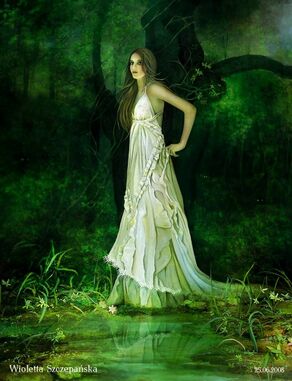
The Greek nymph: Mala
A nymph, in Greek mythology is a female nature diety. They are regarded as divine spirits who animate nature and are depicted as beautiful, alluring ladies.
Role in Myths:[]
These creatures would reside in mountains, rivers, forests and also valleys. Although they would never grow old or catch an illness, and give birth to immortal children (if mated by gods), nymphs were not immortal so they could die by other various reasons.
Nymphs tended to frequent areas, away from human civilization; however, lone travellers outside the villages could come across them.
Etymology:[]
Nymphs are personifications of the creative and fostering activities of nature, most often identified with the life giving outflow of springs: as Walter Burket (Burket 1985:lll.3.3) remarks, "The idea that rivers are gods and springs divine nymphs is deeply rooted not only poetry but in belief and ritual; the worship of these deities is limited only by the fact that they are indesparably identified with a specific locality."
Greek:'Bride'or 'Veiled' Latin(nubere):To marry or 'wed'. These do refer to the fact that Nymphs are mature and marraigable.
In modern Greek folklore[]
The ancient Greek belief in nymphs survived in many parts of the country into the early years of the twentieth century, when they were usually known as "nereids". At that time, John Cuthbert Lawson wrote: "...there is probably no nook or hamlet in all Greece where the womenfolk at least do not scrupulously take precautions against the thefts and malice of the nereids, while many a man may still be found to recount in all good faith stories of their beauty, passion and caprice. Nor is it a matter of faith only; more than once I have been in villages where certain Nereids were known by sight to several persons (so at least they averred); and there was a wonderful agreement among the witnesses in the description of their appearance and dress."
Nymphs tended to frequent areas distant from humans but could be encountered by lone travelers outside the village, where their music might be heard, and the traveler could spy on their dancing or bathing in a stream or pool, either during the noon heat or in the middle of the night. They might appear in a whirlwind. Such encounters could be dangerous, bringing dumbness, besotted infatuation, madness or stroke to the unfortunate human. When parents believed their child to be nereid-struck, they would pray to Saint Artemidos.